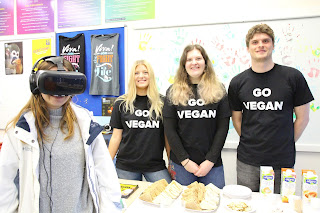Brogan
Pett studied both the FdSc Zoological Conservation and BSc Applied
Zoology at Cornwall College Newquay before completing his MSc in Wildlife
Biology in Edinburgh.
Since then, Brogan has used the knowledge he gained studying to travel the globe pursuing his passion for wildlife and conservation.
He is now working in Paraguay as an Entomology researcher and museum curator with the organisation Fundacion Para La Tierra.
___________________________________________________________________________
We sat down with Brogan to find out more:
The location of the campus is absolutely beautiful, the small size of campus and
classes meant I had very good relationships with my lecturers and tutor, being
able to have a personable chat with lecturers makes a great deal for creative
discussion and enables students to maximise what they gain from classes.
I learnt an awful lot reflecting on the wide range of modules
that we studied, (truly, many many modules), which gave me a great feel for
where I wanted to go in regards to specialisms etc.
- What have you been up to since finishing your course?
 Immediately after finishing my course in Cornwall, I worked in a small village in southern Tanzania for four months on an amphibian monitoring project, followed by a short trip to the Zambezi to jump off the Victoria falls bridge (Terrifying). The following summer (2017) and this summer (2018) I did work as an entomologist for Operation Wallacea in Madagascar.
Immediately after finishing my course in Cornwall, I worked in a small village in southern Tanzania for four months on an amphibian monitoring project, followed by a short trip to the Zambezi to jump off the Victoria falls bridge (Terrifying). The following summer (2017) and this summer (2018) I did work as an entomologist for Operation Wallacea in Madagascar.
This past summer I have been awarded grants from both the Linnean Society and Mohamed Zayed species conservation fund, to conduct an independent
research project after the Opwall season with BSc students from Mahajanga
University on a recently discovered and highly endangered species of Lycosidae
(wolf spider) found in the region.
My actual current role as an entomologist is my dream job. Studying tropical insects / spiders etc. is just mind- blowing. The sheer diversity and range of species, colours and forms is almost too difficult to put across. But it’s something that fills you with wonder everyday.
For more information on the range of Zoology and Conservation courses available at Cornwall College Newquay visit www.cornwall.ac.uk or call 0330123 2523.
We will be used mixed modelling approaches to try and estimate
population sizes and range estimates and see if we can get this pretty spider
some international exposure to aid its conservation.
- What tips would you give future students that you have found useful?
- How did your course help you with your career?
- What is the best thing about a career in conservation?
My actual current role as an entomologist is my dream job. Studying tropical insects / spiders etc. is just mind- blowing. The sheer diversity and range of species, colours and forms is almost too difficult to put across. But it’s something that fills you with wonder everyday.
For more information on the range of Zoology and Conservation courses available at Cornwall College Newquay visit www.cornwall.ac.uk or call 0330123 2523.

















































